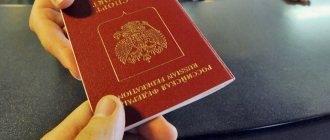Home / Conflict with neighbors / Registration in a communal apartment without the consent of neighbors
Communal housing has a special status - citizens who are not members of the same family live under one roof. Is it possible for a third party or relative to register in a communal apartment and is it necessary to obtain the consent of neighbors?
Differences between registration and registration without the right to living space
The legal aspect of Soviet “registration” was to control the residence of citizens at a particular address. With the beginning of the reform in Russia in the 90s of the last century, the traditional concept of “registration” was replaced by registration at the place of residence, which has a notification nature for the state.
The registration regime has been introduced for citizens of the Russian Federation at any age, including for guests of the country, if they do not have a residence permit. In fact, by registering, citizens notify the migration service of their current place of residence.
Registration does not mean that they own real estate and can dispose of it, although “registration” at one time confirmed precisely the ownership rights. Today, Law of the Russian Federation No. 5242-1 of June 25, 1993 stipulates that all citizens of the Russian Federation must have a place where they are “registered” (read “registered”) permanently. At the same time, the legislator gives them the opportunity to choose their place of residence and move within the territory of Russia for temporary stay or permanent residence.
According to constitutional law, a citizen can live in any region of the Russian Federation for as long as necessary. In addition, thanks to the registration regime, the state regulates migration policy.
Where can I register?
In accordance with the requirements of the Law of the Russian Federation of June 25, 1993 No. 5242-1 “On the right of citizens of the Russian Federation to freedom of movement, choice of place of stay and residence within the Russian Federation,” each person independently decides where to actually live. This could be an apartment or a house. In this case, the property can be your own, in the possession of relatives, or rented out on a lease basis.
It should be noted that regardless of the ownership of the apartment or household, registration in it can be either temporary or permanent.
In your own home
Living in your own home is the best option. In this case, a person independently determines his address, since an apartment or home ownership can be purchased, inherited, by exchange or gift in any region of the country. In this case, you do not need to coordinate your decision with anyone. The only condition in this situation is timely registration.
With relatives
There are often cases when a person lives with his relatives. Most often this concerns elderly or disabled people who cannot take care of themselves. This may also be due to admission to an educational institution, employment, or recommendations from a physician. Registration in this case is possible if there is nowhere else to register, you just need to coordinate your actions with relatives, since the owner or tenant must agree to live together.
In a rented apartment
People can live in an apartment or house on a rental basis. This option involves concluding an agreement. It should be noted that renting housing is most often associated with temporary registration. That is, a person’s residence is limited to certain periods, after which he will be obliged to vacate the occupied premises. You can register in a rented apartment if there is no other housing. In this case, registration is possible with the consent of the owner.
What is registration (“propiska”) without the right to living space?
After registration, the citizen receives the status of a resident at the address indicated in the application. The residential premises may be his property or be hired or rented. Thanks to this status, it becomes possible to use the property located in the residential premises on an equal basis with other residents and registered residents. A permanently registered person at a specific address receives rights to common property if it is an apartment building.
In addition, with the consent of the owner, the registered person can “register” his family members at the same address if he is not the owner. His minor children are registered automatically. In this way, permanent registration is issued without the right to living space, i.e. those registered are not the owners of the premises.
The owner of a residential premises can register there permanently; his rights to the living space are determined by property documents. If a citizen owns several properties, this does not mean that it is necessary to register in each home.
Can there be registration without the possibility of accommodation?
Some people, having allowed a relative into their home, think whether it is possible that he will not at least live with them. Yes, the law allows for the exclusion of the right to dispose of part of the premises . And this gives relief to the hospitable hosts. But nothing more. If a Russian agrees to officially register a relative or someone else in his living space, but denies him residence, then this threatens with punishment. Criminal Code of the Russian Federation in Art. 322.2 imposes a fine on an unscrupulous owner up to 500 thousand rubles.
From the point of view of the authorities, fictitious registration is not only registration using forged documents, but also an unwillingness to live in the place declared to the authorities.
Living conditions for “registration” without the right to living space
The living conditions for temporary registration are the same: the tenant uses the property, pays utilities and rent if necessary. To be on the safe side, the owner can draw up an agreement in addition to the main free rental agreement that gives the right to terminate the relationship unilaterally. If rent is expected, then all the necessary clauses in relation to it are included in the contract as a separate clause.
According to the social tenancy agreement, registration is issued temporarily or permanently, but more often for permanent residence. In this case, the main employer enters into an agreement with the local government, members of his family have the right to register with him, and no rent is provided.
Types of “registrations” without the right to living space
In practice, registration without the right to living space is most often issued by relatives permanently or for a long period of time, when the citizen and his family do not have their own living space.
In another case, temporary registration is required at the place of study or work.
If a citizen has already registered permanently, then when registering for temporary registration, there is no need to register from a permanent address. If the move is carried out within the same locality or region, then there is no need to re-register for registration.
The legislator indicates that registration at the address where the citizen plans to reside permanently must be considered permanent. Temporary registration must include registration associated with a forced move to live at an address other than the permanent one for some time. Permanent registration is unlimited.
The temporary registration period expires by itself, as indicated by the person registering when registering in the application. The same period must be indicated in the temporary registration permit from the owner. When deregistering from your permanent place of residence, you must be deregistered.
When registering permanently, a stamp is affixed to the citizen’s passport. When a temporary “registration” is issued, a certificate is issued indicating the period of stay of the citizen at a certain address.
When two registrations are allowed
Sometimes in life it happens that you need double registration. There are many such cases:
- long-term treatment in another region or city;
- at the request of the employer;
- in case of studying in another region, etc.
You can, of course, just stay there, but without registration you cannot receive social guarantees, be assigned to a clinic, take out loans, or vote.
You may also be interested in: What is the difference between Moscow registration and Moscow region registration.
Registration is necessary for children to study at school or kindergarten.
According to the law, such children have an advantage in admission, since priority is given to those who are registered in the area related to the school. And there is no difference between registration and temporary registration.
It is not permitted by law to have two temporary registrations. One of them must be permanent.
A stamp indicating where the citizen lives is in the passport, plus a certificate is issued confirming the legality of being at the place of residence.
Features of temporary “registration” without the right to living space
A registered citizen cannot in any way prevent a legal transaction that the owner wishes to conduct with real estate. During his registration, the residential premises may well be sold, no one will ask his consent. The registration period will expire from the moment the transaction is completed. Such a citizen also cannot participate in privatization if he is “registered” in municipal housing. Only permanently registered persons are entitled to it.
If meters are not installed in the residential premises, then the amount of utility payments will not be affected in any way by the temporary registration of another person. Payment will be charged only to those registered permanently.
Bottom line
- The question of whether it is possible for a citizen to be registered in two places at the same time is resolved positively only in one case: permanent and temporary registration is made.
- You cannot simultaneously have 2 certificates of temporary registration in different cities. One of them will be illegal.
- Permanent and temporary registration at two addresses can be obtained through a department of the Main Department of Internal Affairs or through a specialized one.
Useful video about temporary registration!
The article was prepared by a lawyer on family and civil issues, Anton Nikolaevich Shcherbak.
If you do not find the information you need, you can get FREE legal advice on our website. Leave your question in the comments or contact a site consultant.
Risks of the owner when registering without the right to living space
The owner, having “registered” a citizen and his family permanently, is at risk, since it will be impossible to issue an “extract” without their will. Such issues often end in court proceedings; permanently registered citizens can present evidence that they have no other address for registration, i.e. they have nowhere to go.
If a minor child or another family member registers in a municipal apartment, he will receive the right to participate in privatization. This means that the share of everyone registered earlier will automatically decrease.
When an apartment owner registers another citizen, it is important for him to pay attention to several points:
In what relationship does this citizen stand in relation to the owner?
How reliably can one know that a citizen does not have his own minor children (as well as adopted children).
Whether the woman to be prescribed is pregnant.
In the most common cases, when it comes to registering someone else’s adult, the risks are minimal: in this case, registration does not imply any rights to provide living space, i.e. We are talking only about registration without legal consequences. It doesn't matter:
presence of disability;
presence of state awards;
belonging to any of the preferential categories of citizens;
having refugee status.
Thus, the state guarantees that the owner’s apartment is inviolable, even if several strangers are “registered” in it. The only case when a person has the right to claim living space relates to close relatives who, by law, have similar opportunities.
The only significant risk for the apartment owner is associated with two factors:
If the person prescribed does not agree with the need to write it out, such a problem will have to be resolved only through the court. A registered citizen (including on the basis of temporary registration) has the right, without the consent of the owner, to also register all his minor children, who, however, still do not have any property rights. However, it will be much more difficult to write them out, including in court.
Increase in utility bills. This risk is the main one, since an actual increase in payments for all utility services will inevitably occur. If meters are installed, payment will be charged only according to their readings. However, some services (for example, housing maintenance) are charged according to the number of registered ones - for example, the volume of garbage removed directly depends on the number of residents. If there are no meters, the situation is aggravated because utilities will charge according to established standards, which are determined by the number of registered residents. The actual residence or absence of a registered person is not grounds for reducing or increasing utility bills. Thus, the option is especially unprofitable if a citizen is registered and lives in a house without meters - then the payment increases, even if in fact he does not use water, electricity and other services.
Is it possible to have two residence permits in one city?
A person may be permanently registered in one area of the city, but temporarily registered at another address. You cannot receive two certificates at the same time.
The stamp in the passport is placed on the basis of documentation of ownership (sale and purchase agreement, gift, extract from the Unified State Register),
For non-permanent registration, a basis is also required: approval from the owners, a rental agreement.
Example. Sergeev V.M. wants to register at two addresses in one city. He is registered with his parents in Moscow on Kukhmisterova Street. Sergeev wants to live separately from his parents, so he rented an apartment located on Udaltsova Street. Specialists of the territorial Department of the Ministry of Internal Affairs will issue a certificate.
Thus, Sergeev will have two registrations: one permanent with his parents and the second non-permanent in rented housing.
If Sergeev needs to register in another place for a while, he must first notify the registration authorities about his move from Udaltsov Street, and then register at the new address.
Design is important not so much for adults as for children. An adult will be able to find a job, albeit unofficially, even without a certificate. But placing children in a kindergarten or school without a certificate of residence will be very problematic.
So let's register. Each school is now assigned certain territories. Admission of children from other streets is carried out on a residual basis. If there are free places left, the child may be accepted.
In different cities
For some, a situation may arise when they have two or even more apartments in different regions or cities. And he alternately lives in one, then in the other. In this case, it makes sense to apply for two registrations. One will be temporary and the other permanent. And the owner himself will decide how long it takes for him to obtain temporary registration in the 2nd living space.
When a person lives for a long time in another region of the country, then it becomes mandatory for him to register temporarily. If he does not do this, he faces a fine.
It is also worth knowing that registration depends on the location of the apartments. If they are located in the same region, then registration is a citizen’s right, but not an obligation.
Moscow and the Moscow region are one in this case, as are St. Petersburg and the Leningrad region, as well as the Republic of Crimea and Sevastopol.
In different countries
While living abroad, the Russian citizen is not restricted from permanent registration within his country. But he has a duty when he arrives in his state. He needs to register temporarily in order to give the foreign state the opportunity to control migration.
This is also done to help citizens obtain various services outside their country. This includes receiving medical care, getting a job, etc.
Citizens who have dual citizenship stand out. In their case, it is possible to have two places of registration, one in each country.
Risks of the owner when “registration” without the right to the tenant’s living space
Despite the fact that registration without granting the right to living space does not have legal risks as such, the tenant’s lifestyle itself carries several possible threats.
The tenant takes out a loan and makes arrears: collection services and/or bank representatives will also visit the place of residence (based on temporary registration), as a result of which the owner will have to explain that such a person does not live here (if in fact the citizen has already left)
The tenant commits a crime: the police will definitely go to the owner; in worst cases, he may even be considered a suspect (accomplice)
The tenant evades conscription into the Armed Forces: summonses will be sent to the registration address, and in the worst cases, the police begin to suspect that the owner is helping the evader by hiding his location
The tenant violates traffic rules: fines will be sent to the temporary registration address, so the owner will have to notify the tenant about this
The tenant violates public order; there is a direct threat to the personal safety of the owner, his family, as well as the risk of being taken to the police based on complaints from neighbors.
Thus, the only real danger is the tenant’s unseemly behavior, and not the loss of living space, which is completely excluded by law. Therefore, it is better to get to know the tenant well and not to register dubious persons in the apartment, even if they promise not to actually live there.
Decor
The registration is carried out by the Ministry of Internal Affairs, namely the Main Directorate for Migration Issues. Documents for the procedure should be submitted through the MFC in.
There are also positions such as passport officers. They collect documents for discharge and registration, provide samples and help fill them out.
Documents can be:
- Extract from the Unified State Register of Real Estate Rights;
- Lease agreement;
- The owner's consent to the registration of another person.
For temporary registration, fill out an application in Form No. 1. And a certificate is issued for the place of the stamp.
Subtleties of design
Without permanent registration, you are not allowed to stay on Russian territory for more than seven days. Otherwise you will have to pay a fine.
There are also penalties for lack of temporary registration. Punishment is imposed if it is confirmed that a citizen lives without registration in another city for more than ninety days. Moreover, sanctions are established not only in relation to citizens, but also to home owners.
The period of non-permanent registration corresponds to the duration of the rental agreement. The length of stay for tenants is determined by the owner of the property.
You can live without documents only with close relatives (father, spouse) or in the territory of one region.
Read also: How to change the owner of an apartment between relatives.
The question of whether it is possible to have two temporary registrations is not directly resolved by law. However, the concept of fictitious registration is defined by law.
Example. The Ivantsev spouses live in the Leningrad region. They have permanent residence there. The couple plans to move to St. Petersburg. They do not need to register. However, to receive benefits, allowances, and register vehicles, a certificate will be required.
How to obtain permanent “registration” without the right to living space
You can register at any branch of the Federal Migration Service (FMS) or through:
MFC;
Passport Office;
management company (housing office);
State Services portal.
Registration can be issued to a relative or a stranger. If, for example, the owner is a husband, and he registers his wife, then she receives ownership, even if it has not been documented (Family Code, Article 34 “Joint property of spouses”).
The rest of the citizens, even the children of the owner, are registered without the right to living space. If the premises belong to several owners, then they must give their consent to the registration of any citizen, except for minor children (Civil Code, Article 247 “Ownership and use of property in shared ownership”). The consent of the co-owners is drawn up in writing and certified by a notary.
A new tenant is registered in a municipal apartment with the consent of the remaining registered ones. To register in a dormitory, the employer must give his consent if he officially works for him.
Mandatory deadlines for “registration” without the right to living space
By law, registration is required within 7 days from the moment a citizen arrives at his new place of residence. If he is discharged from his permanent place of residence, then the move may take much longer; the legislator also takes this into account.
A registering citizen submits an application and other documents to a government agency that is officially authorized to carry out registration/registration on the territory of Russia. Government agencies act as intermediary structures between the applicant and the Federal Migration Service, so the procedure takes 7-10 days.
The applicant submits original documents and copies, which are collected by a government agency employee against signature. On the appointed day, the citizen must appear for a passport and temporary certificate.
List of documents for registration of “registration” without the right to living space
For registration, a citizen submits to the authorized organization:
Passport
Property documents for owners
Extract from the Unified State Register of Property Rights
Social tenancy agreement (for tenants)
Lease agreement (for landlords)
Statement of the established form
Consent for registration from the owner, co-owners registered in the premises
Departure sheet for those who have already issued an extract from the old address
Municipal permit (for moving into public housing)
When it is necessary to register in a communal apartment, the consent of other apartment residents is not required. If a citizen registers with the owner of a private house with separate entrances, divided into shares between co-owners, then the consent of the other co-owners is also not required.
The applicant and the owner are required to be present when submitting documents. If one of them cannot, then you will have to submit a notarized power of attorney to an authorized person. The FMS is not interested in an agreement on the possibility of early termination of relations between the tenant and the landlord. In case of a controversial situation, he is presented to the court.
The nuances of obtaining a “registration” without the right to living space for a minor child
“Registration” without ownership rights is only possible if the apartment or other object is privatized.
Minor children are registered at the place of registration of their parents or one of them. This does not require permission from the owner of the premises or registered persons. When submitting documents, you must provide the child’s birth certificate; if he is registered with only one parent, then the notarized consent of the mother (for the father) or the written permission of the father (for the mother) is required.
It is necessary to take into account that a minor cannot be registered independently in the premises if it belongs to him as property, so at least one parent will have to register there. When moving to a new place with a family, a child also needs to be registered temporarily, which is important for receiving various social benefits.
It is allowed to register a child temporarily alone, for example, in a dormitory from the age of 14, but his legal representatives give their written consent. He can also be registered permanently with his relatives without his parents, but only with their permission. Without parental consent, a citizen is allowed to make a decision on discharge and registration at the place of temporary or permanent residence from the age of 18.
The registration period for a minor does not differ from that for an adult; only a newborn is allowed to register within a month from the moment the birth certificate is received. A woman can apply for initial registration on her own, even without the father’s permission, if the child is registered only with her.
If the parents are divorced, then the child is legally registered with the person on whom the court assigns responsibility for his upbringing. But this rule applies to situations where parents cannot agree on the registration of a minor peacefully.
In the event that parents are deprived of their rights and a child is placed in an orphanage or orphanage, this does not mean that he can lose the right to property. But in this situation, it must be registered at the address of the government agency where it will be located. The person responsible or his legal representative for registration is an employee of a government agency.
In some cases, the mother (father) will not be able to “register” the child with the father (mother) if he (she) was deprived of parental rights or was serving a sentence in prison.
Permanent registration without the right to housing is carried out according to the same rules as for adults.
✅ If the tenant of municipal housing registers
Municipal property is owned by the municipality, not the residents (they are the tenants). Long-term (over 90 days ) residence in such an apartment without registration will result in a fine. The grounds for registration are regulated by the Housing Code of the Russian Federation (Article 70, Chapter 8).










